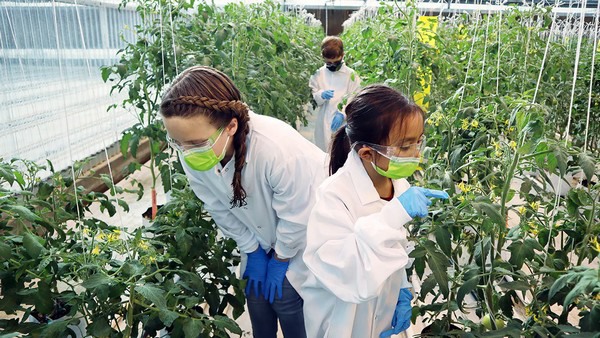From aggressive diseases and pest pressures to climate shifts, labor shortages, and evolving consumer preferences, growers are facing more and more challenges in their work to grow nutritious and great-tasting fruits and vegetables. Innovation is critical in helping growers overcome those obstacles and ensuring consumers have access to healthy foods. That’s why for 50 years, Bayer’s Research & Development station in Woodland, Calif., has been at the heart of driving that purposeful progress.
“Our environment continues to change, both literally and figuratively, and growers have to navigate those changes quickly,” says J.D. Rossouw, Head of Vegetables R&D at Bayer’s Crop Science Division. “Our Woodland Research Station is a hub for innovation to help them do that. There, we are helping identify new disease-resistant hybrids, cutting-edge technologies, sustainable solutions, and best management practices that are helping growers in North America and around the world.”

It started with innovation
The facility, which was started by Petoseed in 1972, initially focused on developing tomato hybrids resistant to the fungal disease Alternaria stem canker, which was threatening to decimate tomato crops in San Diego County. The new hybrid was planted by area farmers and is credited with saving the area’s tomato industry.
The research station today
After mergers and acquisitions, Bayer has transformed the research facility into a cutting-edge center for innovation, helping vegetable growers in California, the United States, and around the world. It’s part of Bayer’s network of breeding and testing hubs that are strategically located, and all focused on the company mission of “Health for All. Hunger for None.”
The Bayer site features 90,000 square feet of lab and research space in addition to 68 greenhouses, three germplasm houses, and nearly 400 acres of fields for testing. Diverse, multidisciplinary teams of plant breeders, pathologists, cell biologists, data scientists, logistics experts, and market development representatives work together to identify ways to improve plant health, advance sustainability, test best practices, and address on-farm challenges and consumer demands.
“Woodland brings together the industry’s best to advance agriculture,” says Rossouw. “We test new technologies that help us capture real-time data about crops in the field. Our scientists research advanced genetics. We created the first Green Farm to test how the farmscape and biodiverse ecosystems can help farmers improve soil and plant health more sustainably. And our work with start-ups made us one of the first companies to test the benefits of planting cover crops in improving water management and controlling undesirable weeds.”
Some additional highlights at the facility include:
- First foundation seed department in the industry (~1978)
- Cell biology lab (1986)
- Vegetable quality lab (1990)
- Seminis™ brand formed, markers lab and pathology lab (1995)
- Consumer health initiative (2005)
- Numerous blockbuster varieties are developed locally and sold throughout the world
The Woodland site will continue to play a pioneering role in testing and implementing novel technologies in vegetable breeding and product development. One example of that commitment was Bayer’s recent establishment of an on-site incubator where start-ups can research and test their cutting-edge technologies. That helps Bayer advance products and solutions even faster.
Purposeful innovation
Ultimately, all the innovation that happens at Woodland is focused on benefiting people, including the surrounding community as a whole. In addition to Bayer Fund grants, sponsorships, and volunteer time, Bayer works with local students and community members to educate, train and inspire them to help advance agriculture.
The site hosts university students for internships and joint research projects. It also provides mentorship for local high school students, inviting them to learn about plant biology disciplines. In 2021, the company opened Baylab Woodland, the first Baylab community in the United States. “We are proud to be one of only 18 Baylabs in the world. We invite student groups to visit our STEM education center to learn about ag science in a hands-on environment, inspiring young people toward future careers in agriculture,” says Lisa McDaniel, Head of Sustainability and Engagement for Vegetables R&D.
50th Anniversary
Woodland will be celebrating its 50th anniversary with employees, growers, and the community all year long. You can learn more about the Woodland Research Station – its history, the impact it has made, and the innovations it continues to drive forward – by visiting its anniversary web page here.
For more information: 
Bayer
www.bayer.com
